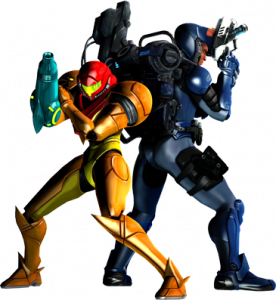 Review by: Ryan Barrett
Review by: Ryan Barrett
Original Publish Date: Pending
Final rating: 8.9/10
Thank you Nintendo for sending me this review copy!
PREFACE:
Code name: “Baby’s Cry.” A common SOS with the urgency of a baby crying. The nickname comes from the fact that the purpose of the signal is to draw attention. The signal was coming from a remote part of space. I altered the course of my ship as if this detour had already been part of my flight plan. Baby’s Cry… It was though it was crying specifically for me.– Samus Aran
I have read many other reviews of this game on various websites and magazines, and it seems people may have missed the point of Other M. Not only is Other M one of the best games released on the Wii, it is possibly one of the best Metroid games to date. However, I may be a little partial to Metroid, seeing as I help run and maintain the greatest Metroid fansite on the internet. For all those reviewers out there, this is for you:
Metroid Other M is a fantastic game. It’s rather surprising to me how little respect it seems to be getting by fans and non-fans alike, or even the people who claim to be fans but are just lying to achieve some kind of imaginary, worthless “reputation” among their peers and readers/viewers. The way I see it, the players of the game create these preconceived notions of what a Metroid game should be like, or how Samus should act and feel, and I’m here to tell you that you’re all full of shit. There’s only one party that can decide on what the content of a game is like, and that’s exclusively THE DEVELOPER. In this case, it’s Team Ninja and Nintendo. Eight years ago, people flipped out over Metroid going into a 1st person perspective and look what it got them: three fantastic games, and it kept the series alive for another decade. Better than nothing, right? Would you rather have had Metroid fade into obscurity? Have Samus become nothing more than a cameo in a Smash Bros. game? It’s almost downright sickening to read and listen to some people’s reactions to this game. You can’t possibly fathom anything different than what’s already been done? Grow up, and get a grip people. Other M is definitely not the nail on the coffin to an excellent franchise. In fact, it’s pretty far from it.
Interactivity
So you have people waiting desperately, perhaps 16 years or more, for a true 3D, 3rd person perspective Metroid game? Does Other M deliver? It delivers. The traditional parts of the game have Samus moving quicker and more nimble than she’s ever been before. As I had predicted from the very beginning, Samus controls very similarly to Ryu in the new Ninja Gaiden games. Her run is very fast, and her jumping abilities are responsive and fun. She wall jumps (called a wall “kick” in the game) exactly like Ryu, and it’s easier to accomplish than it has ever been. Even the Screw Attack, Space Jump, Speed Booster and Shinespark were retained, and it feels very refined and polished.
That’s not to say everything is refined and polished. The game’s “hook,” in which you change positions with your hands to point the Wiimote at the screen in order to go see through Samus’s visor, comes off as a somewhat fumbled attempt. These moments only seem to work well at slow “discovery” points where you are searching around for secrets and hidden things. When it comes to battling several enemies that are in your face, switching to first person only comes off as a hassle and just adds further stress to an already intense situation.
The obvious fix for this would have been to give players the option to also use the Nunchuck + Wiimote control scheme, but Sakamoto chose to stick to his guns, and keep the game as “Famicom-esque” as possible. I understand Sakamoto’s decisions, but I am ultimately disappointed by it. It doesn’t entirely ruin the game – in fact, they make the game go into slo-mo for a brief moment to allow your brain to catch up – but it only works well about 75% of the time. Maybe additional playthroughs will help me get better at this, but the first time through can be somewhat frustrating. The other thing that only works part of the time is the auto-aim. The game does go to great lengths to make the auto-aim responsive, and it almost always is. But every now and then you’re going to get to a point where you may have to reposition yourself to let auto aim work. This may result in some missed charge shots, and more frustration. It does feature one of the most brilliant uses of the Wiimote speaker ever – you will hear a beep at a full charge, which leads you to rely on your ears instead of your eyes.
The game has a number of quirks that make it very different than that of a traditional Metroid game. One of these is the game forces you to be in first-person at key story scenes in the game, where you must search around and play detective for a moment to move on. The first time these happen you may have some trouble figuring out what to do next, but in additional playthroughs, that time will be completely gone. Again, they don’t completely ruin the experience, but they do interrupt the gameplay slightly. There are also times where the camera zooms in over Samus’s shoulder and you walk ever-so-slowly, usually adding tension during a certain plot point. As usual, this seems to be lost on unappreciative and impatient gamers, who just want to run around and blast things. So the game features not two, but four distinct ways in which you control Samus. How could this possibly be looked at as a bad thing?
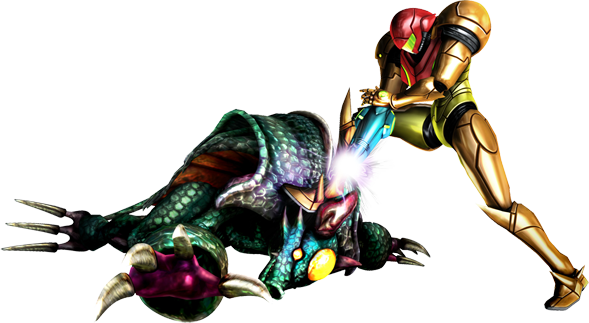
Aesthetics
No, the graphics do not suck. In fact, the models, textures, and animations in this game are probably some of the best on the Wii. 99% of the time the game runs at a silky-smooth 60fps, pushing the Wii to its very limit. There are times during intense battles with multiple large enemies that you may notice a hint of slowdown, but I didn’t really seem to mind. Samus is realized in 3D to absolute perfection – her model is beautifully normal mapped and she has curves in all the right places. Fans of the series will notice many classic Metroid enemies – sidehoppers, geemers(zoomers), skrees, wavers, magdolites, and many more – return and look even more menacing and grotesque than ever. You can really tell that Team Ninja was thrilled to be working on a Metroid title.
The game does have its fair share of lazy development, though. One that sticks out was when I noticed the “icicles” hanging from the ceiling in an icy room:
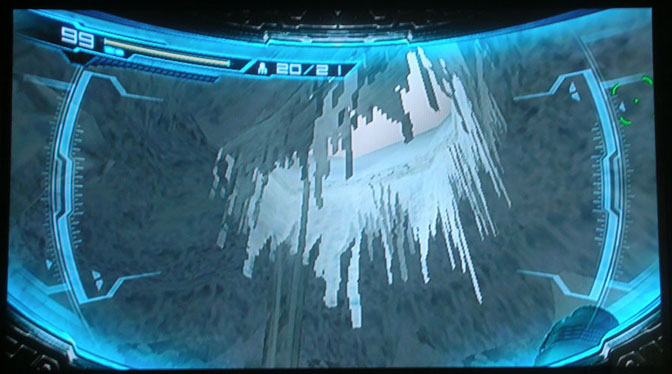
Planes with alpha maps? Would it have killed you to add a few more polys to those things?
Other than a few obvious examples the game’s textures are also colorful and lively. It isn’t quite on-par with the brilliance seen in MP3, but it’s definitely well-realized and does its job. The enemy models are also completely awesome and the bosses are truly a sight to behold. This game does things on the Wii that I only imagined the other two current-gen consoles were capable of doing. I am really impressed with the job Team Ninja has done with the game’s look.
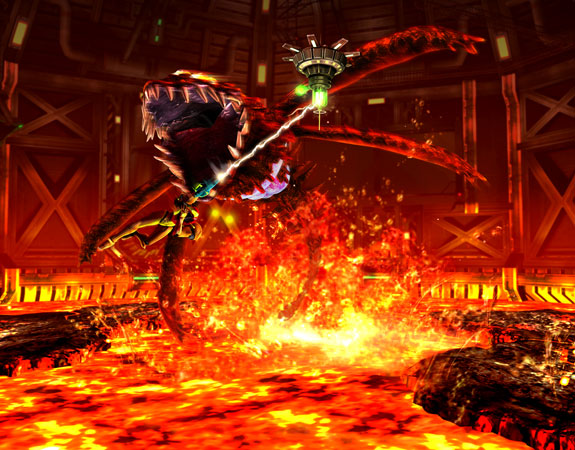
Believe it or not, this image is closer than you think to being real game footage.
As one would expect, the CGI in the game is gorgeous. D-Rockets has put such care and attention to detail into these cutscenes and I was quite impressed. The realtime cutscenes, while mocapped, are still beautifully realized. They also did a splendid job with the realtime lip sync (though the prerendered ones slightly miss the mark) as well. Nothing but great things to say about the cutscenes.
The music and few instances of the voice acting is unfortunately the only drawback to the game’s aesthetics. While the orchestrations are very well-composed, they are not melodic at all. Instead we are given atmospheric, tension-building pieces that sound like they belong more in a big budget, Hollywood sci-fi movie rather than a Metroid game. I’m not saying the score doesn’t suit the game however, as it does play out more like a sci-fi movie than a traditional Metroid, but it would have been nice to hear some more beautiful Metroid-esque pieces fully orchestrated.
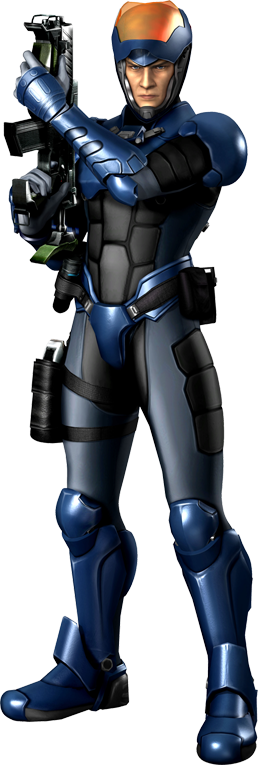
Content
The game’s content is basically what you’d expect from a traditional Metroid game. The Bottle Ship is rife with eerily realistic faux-environments in which you must traverse and uncover secret or hidden pathways to progress. Even though it is definitely more linear than all [Other M]etroids, you can still take your time and search for powerups at your leisure. I appreciated most of the game’s level design – the fact that if you get good enough, you can shinespark to the end of long hallways. This will be good for the speedrunners. The powerup locations are a little bit on the easy side, as any Metroid veteran will notice, but they’re still fun to find and collect. I also noticed many things about the game that seemed like direct nods to the Prime series, so it’s good to know that it seemed like Retro’s Trilogy was successful in influencing some things in the game.
I do wish the game was a little longer. Instead of just three sectors and one main sector, I would have liked four or five, but the game’s experience is a thrilling ride while it lasts. There is also a part at the very end (which I won’t spoil for you) that I would have loved to traverse through, but ultimately end up not being able to, and that was slightly disappointing. The game also may seem a little hand-holdy at times with telling you exactly where to go on the map, but if it wasn’t there, people would probably still complain that they didn’t know where to go. I loved pulling off all of Samus’s Overblast and Lethal Strike moves. They allow you kill enemies in multiple ways and never stop being satisfying. I was also very impressed by the game’s feeling of empowerment. Enemies that give you quite a hard time earlier in the game become a pushover once you get the Screw Attack, and it feels AMAZING to zip right through them in typical Metroid fashion.
Another change from the Metroid formula is how you regain life and missiles, which is now solely based on the “Concentration” move. To concentrate, you must hold the Wiimote vertically and press A (the same button that’s mapped to Morph Ball), and as you do this, a bar will go across your health meter and you regain your health when it’s full. But you can only do this when it’s low, so unfortunately there is no pickup farming this time around. This was a major design decision, as pickups/enemy drops are a big part of any video game, but it just seems to me like a progressive-thinking decision centered around realism and innovation, rather than an incorrect or poorly-made one. The game’s plentiful save rooms replenish everything anyway, so there really isn’t any room to complain here. Speaking of save rooms: they are automatic; you choose if you want to save or not by deciding whether or not to stand on the save platform. It may sound funny, but I loved saving my progress.
The game also has some awesome surprises in store for Metroid fans and it never ceases to be an exciting, fun experience. I can’t emphasize enough how pleased I was with some of these parts in the game. There are times where I literally found my jaw had dropped, not able to grasp that it was placed in the game. Fanservice rocks.
Overall
Contrary to what people have been saying, the CGI, voice acting, level design, graphics and sound, and play control are very well done. It has a touch of finesse and quality that really can’t be found elsewhere on the Wii. But you need to play it to find out for yourself. The game may be slightly different from a traditional Metroid game, but I also learned that people just can’t cope with change. It just takes time. Most likely if you’re a Metroid fan and reading this, you’ve already made that purchase. People hated Fusion at first, too, and this game feels like it in a lot of ways. But I don’t really expect anyone to balance their entire decision based on what I say, anyway.
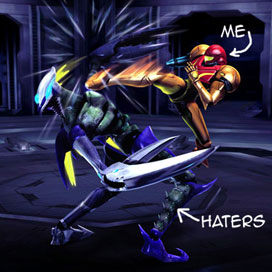
AFTERWARD:
In traditional Metroid fashion, you start off somewhat weak (due to direct orders from Adam) and end the game completely powered up and kick ass, dealing death to any creature in your wake after you’ve activated all the features you had the whole time. There has been a lot of complaints about this – Samus directly listening to Adam, even though she’s a “strong, independent woman” and it makes her “out of character.”
Well, it seems you guys are never satisfied. What would the alternative have been? Samus just happens to start off completely powerless, like in Metroid II and Super? Possibly an explosion or enemies stealing her weaponry ala Prime 1 and 2? How about changing the structure of her suit after coming back from a near-death experience like in MP3 or Fusion? And how would she then regain those lost powerups? You’re not on Zebes since it blew up, and Chozo statues have been done to death. The alternative is simple: Samus already has all her powerups. She doesn’t need to find them, just turn them back on. It’s not only the most logical choice, it’s the most convenient. And Other M is the first Metroid game to do it. While not accessing the Varia in a super-hot area when she already has it seems a little odd, it’s the only way to show a player how truly important it is. To me, your complaints come off as nothing more than a baby’s cry. –IE


